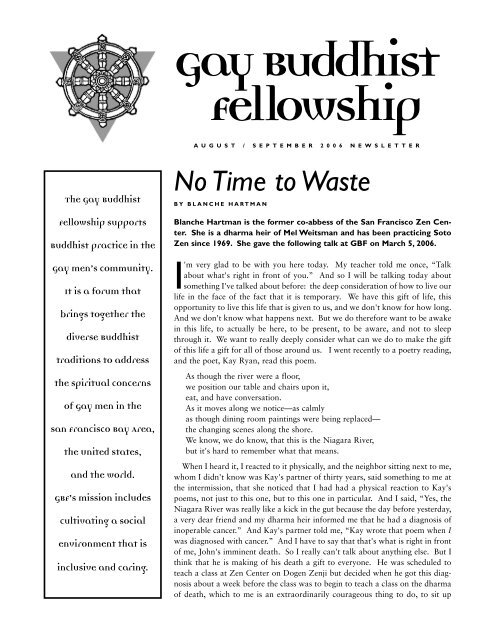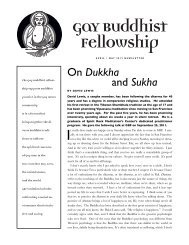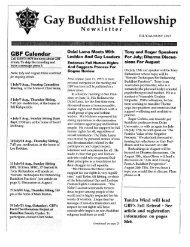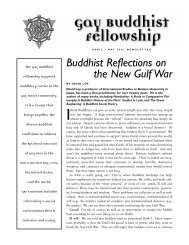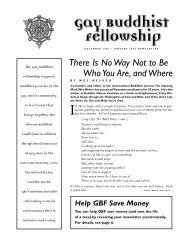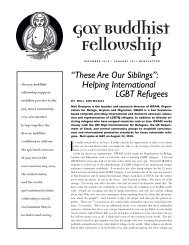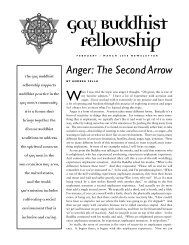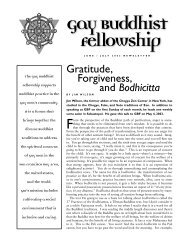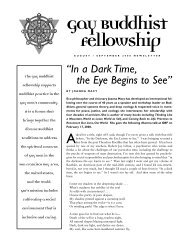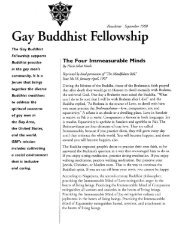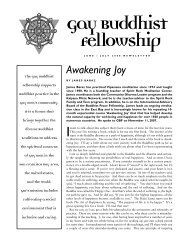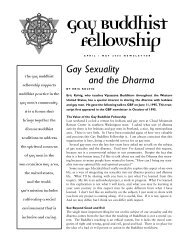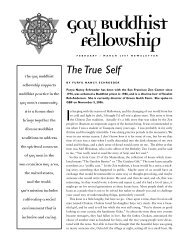2006.08 Blanche Hartman (No Time to Waste).pdf - Gay Buddhist ...
2006.08 Blanche Hartman (No Time to Waste).pdf - Gay Buddhist ...
2006.08 Blanche Hartman (No Time to Waste).pdf - Gay Buddhist ...
You also want an ePaper? Increase the reach of your titles
YUMPU automatically turns print PDFs into web optimized ePapers that Google loves.
<strong>Gay</strong> <strong>Buddhist</strong><br />
Fellowship<br />
A U G U S T / S E P T E M B E R 2 0 0 6 N E W S L E T T E R<br />
The <strong>Gay</strong> <strong>Buddhist</strong><br />
Fellowship supports<br />
<strong>Buddhist</strong> practice in the<br />
<strong>Gay</strong> men’s community.<br />
It is a forum that<br />
brings <strong>to</strong>gether the<br />
diverse <strong>Buddhist</strong><br />
traditions <strong>to</strong> address<br />
the spiritual concerns<br />
of <strong>Gay</strong> men in the<br />
San Francisco Bay Area,<br />
the United States,<br />
and the world.<br />
GBF’s mission includes<br />
cultivating a social<br />
environment that is<br />
inclusive and caring.<br />
<strong>No</strong> <strong>Time</strong> <strong>to</strong> <strong>Waste</strong><br />
BY BLANCHE HARTMAN<br />
<strong>Blanche</strong> <strong>Hartman</strong> is the former co-abbess of the San Francisco Zen Center.<br />
She is a dharma heir of Mel Weitsman and has been practicing So<strong>to</strong><br />
Zen since 1969. She gave the following talk at GBF on March 5, 2006.<br />
I'm very glad <strong>to</strong> be with you here <strong>to</strong>day. My teacher <strong>to</strong>ld me once, “Talk<br />
about what's right in front of you.” And so I will be talking <strong>to</strong>day about<br />
something I've talked about before: the deep consideration of how <strong>to</strong> live our<br />
life in the face of the fact that it is temporary. We have this gift of life, this<br />
opportunity <strong>to</strong> live this life that is given <strong>to</strong> us, and we don't know for how long.<br />
And we don't know what happens next. But we do therefore want <strong>to</strong> be awake<br />
in this life, <strong>to</strong> actually be here, <strong>to</strong> be present, <strong>to</strong> be aware, and not <strong>to</strong> sleep<br />
through it. We want <strong>to</strong> really deeply consider what can we do <strong>to</strong> make the gift<br />
of this life a gift for all of those around us. I went recently <strong>to</strong> a poetry reading,<br />
and the poet, Kay Ryan, read this poem.<br />
As though the river were a floor,<br />
we position our table and chairs upon it,<br />
eat, and have conversation.<br />
As it moves along we notice—as calmly<br />
as though dining room paintings were being replaced—<br />
the changing scenes along the shore.<br />
We know, we do know, that this is the Niagara River,<br />
but it's hard <strong>to</strong> remember what that means.<br />
When I heard it, I reacted <strong>to</strong> it physically, and the neighbor sitting next <strong>to</strong> me,<br />
whom I didn't know was Kay's partner of thirty years, said something <strong>to</strong> me at<br />
the intermission, that she noticed that I had had a physical reaction <strong>to</strong> Kay's<br />
poems, not just <strong>to</strong> this one, but <strong>to</strong> this one in particular. And I said, “Yes, the<br />
Niagara River was really like a kick in the gut because the day before yesterday,<br />
a very dear friend and my dharma heir informed me that he had a diagnosis of<br />
inoperable cancer.” And Kay's partner <strong>to</strong>ld me, “Kay wrote that poem when I<br />
was diagnosed with cancer.” And I have <strong>to</strong> say that that's what is right in front<br />
of me, John's imminent death. So I really can't talk about anything else. But I<br />
think that he is making of his death a gift <strong>to</strong> everyone. He was scheduled <strong>to</strong><br />
teach a class at Zen Center on Dogen Zenji but decided when he got this diagnosis<br />
about a week before the class was <strong>to</strong> begin <strong>to</strong> teach a class on the dharma<br />
of death, which <strong>to</strong> me is an extraordinarily courageous thing <strong>to</strong> do, <strong>to</strong> sit up
there with his impending death, <strong>to</strong> teach about the dharma<br />
of death. And he's done a great job, <strong>to</strong>gether with another<br />
person who practices over at Hartford Street with him.<br />
He's teaching by the way he's responding. His <strong>to</strong>tal attention<br />
is on how <strong>to</strong> take care of everyone around him as he's<br />
dying, how <strong>to</strong> see that the prison network that he is active<br />
in that teaches dharma—he goes <strong>to</strong> teach dharma and<br />
harm reduction and nonviolence at San Bruno, at the<br />
down<strong>to</strong>wn jail, out at San Quentin—is passed on <strong>to</strong> other<br />
people and that he gets clearance for the person who's<br />
going <strong>to</strong> replace him. This is the kind of thing he's doing,<br />
frantically, being sure that his affairs are all in order and<br />
that his partner will inherit the house and not have any<br />
interference from his family and all this kind of stuff. He's<br />
just <strong>to</strong>tally putting his energy in<strong>to</strong> how <strong>to</strong> take care of<br />
everybody around him. It's quite extraordinary. It's a<br />
teaching in itself.<br />
I've always liked this poem by Mary Oliver, and I'll say<br />
more about it after I read it.<br />
When death comes<br />
like the hungry bear in autumn;<br />
when death comes and takes all the bright coins from<br />
his purse<br />
<strong>to</strong> buy me, and snaps the purse shut;<br />
when death comes<br />
like the measles-pox;<br />
when death comes<br />
like an iceberg between the shoulder blades,<br />
I want <strong>to</strong> step through the door full of curiosity,<br />
wondering:<br />
what is it going <strong>to</strong> be like, that cottage of darkness?<br />
And therefore I look upon everything<br />
as a brotherhood and a sisterhood,<br />
and I look upon time as no more than an idea,<br />
and I consider eternity as another possibility,<br />
and I think of each life as a flower, as common<br />
as a field daisy, and as singular,<br />
and each name a comfortable music in the mouth<br />
tending as all music does, <strong>to</strong>ward silence,<br />
and each body a lion of courage, and something<br />
precious <strong>to</strong> the earth.<br />
When it's over, I want <strong>to</strong> say: all my life<br />
I was a bride married <strong>to</strong> amazement.<br />
I was the bridegroom, taking the world in<strong>to</strong> my arms.<br />
When it is over, I don't want <strong>to</strong> wonder<br />
if I have made of my life something particular, and real.<br />
I don't want <strong>to</strong> find myself sighing and frightened,<br />
or full of argument.<br />
I don't want <strong>to</strong> end up simply having visited this world.<br />
I particularly like the line “I want <strong>to</strong> be full of curiosity.”<br />
I deeply hope that I can meet my death in that way.<br />
<strong>No</strong>body knows what happens next. Among the handouts<br />
for John's class, there was one with a quote from Socrates:<br />
“To fear death, gentlemen, is nothing other than <strong>to</strong> think<br />
oneself wise when one is not, for it is <strong>to</strong> think that one<br />
knows what one does not know. <strong>No</strong> man knows whether<br />
death may not even turn out <strong>to</strong> be the greatest of blessings<br />
for a human being. And yet people fear it as if they knew<br />
for certain that it is the greatest of evils.” We don't know.<br />
We have, of course, in our culture many descriptions of<br />
what we think may happen, all the way from Heaven <strong>to</strong><br />
Hell and anything in between, from nothing <strong>to</strong> everything.<br />
We don't know. But I think that the most important thing<br />
in the face of that not knowing is <strong>to</strong> know that we don't<br />
know and not <strong>to</strong> meet it with fear but with curiosity.<br />
One of the great virtues of Buddhism is said <strong>to</strong> be generosity,<br />
or dana, or giving. But the teaching is that a monk<br />
doesn't give material things because a monk is homeless<br />
and a mendicant. But a monk gives fearlessness; a monk<br />
gives the dharma and a monk gives fearlessness. When I<br />
first read that, I said, “Oh, I don't know anything about<br />
fearlessness. How can I give fearlessness? I'm a monk and<br />
I don't know how <strong>to</strong> give fearlessness. So I need <strong>to</strong> study<br />
this business of fear and fearlessness.” So far, as much as<br />
I've studied it, I don't think fearlessness means not ever<br />
experiencing fear, but I think it does mean something like<br />
not being cowed by it, not being overcome by fear, just<br />
noticing, yes, there's fear, and maybe turning <strong>to</strong>ward it and<br />
actually breathing with it and feeling it. Allow it <strong>to</strong> arise<br />
and <strong>to</strong> subside and don't allow it <strong>to</strong> chase us around, making<br />
us run off and hide or distract ourselves with foolish<br />
activity. We want <strong>to</strong> choose our life in the face of the certainty<br />
of our death. There's another quotation from the<br />
Mahabharata, the great Indian classic, where the sage is<br />
asked, “Sir, of all the things in life, what is the most amazing?”<br />
And the sage answers, “That a person seeing others<br />
die all around him never thinks that he will die.” And I<br />
must say, that first week after John <strong>to</strong>ld me, I just simply<br />
could not let it in. The grief was <strong>to</strong>o much, so I couldn't<br />
allow myself <strong>to</strong> even think about it. But the thing is not <strong>to</strong><br />
deny it or turn away from it, but <strong>to</strong> recognize it, let the fact<br />
of the limited nature of our life be an encouragement <strong>to</strong><br />
live it well, <strong>to</strong> live it in a way that benefits everyone, <strong>to</strong> not<br />
get caught up in fear and self-clinging and forget our con-<br />
2 GBF AU G U S T / S E P T E M B E R 2 0 0 6 N E W S L E T T E R
nection with everything and everyone, but <strong>to</strong> live our life<br />
in a way that makes of it a gift for everyone. Whatever we<br />
have found <strong>to</strong> be beneficial <strong>to</strong> us, can we offer that <strong>to</strong> others?<br />
Whatever has given us great joy, can we find a way <strong>to</strong><br />
share that with others? Can we take the gift of this life and<br />
spread it around <strong>to</strong> all beings? This, of course, is the bodhisattva<br />
vow: “Beings are numberless; I vow <strong>to</strong> awaken<br />
with them. Delusions are inexhaustible; I vow <strong>to</strong> end<br />
them. Dharma gates are boundless; I vow <strong>to</strong> enter them.<br />
The Buddha way is unsurpassable; I vow <strong>to</strong> become it.”<br />
This is the bodhisattva vow; this is the ideal of Mahayana<br />
Buddhism: recognizing our <strong>to</strong>tal and complete interconnection<br />
and interdependence with everything that is, vowing<br />
<strong>to</strong> honor that by waking up ourselves for the benefit of<br />
all, sharing this life with all. And I don't know anyone<br />
who exemplifies that vow more than John does. Many of<br />
you probably know John King. He helped Issan Dorsey<br />
start the Hartford Street Zen Center and helped found the<br />
Maitri Hospice, and he's just a beautiful guy.<br />
So knowing that life is brief, how shall we live it? This<br />
actually was the koan that brought me <strong>to</strong> practice, because<br />
I had a friend forty years ago who had a terrible headache<br />
one evening when we were sitting around and having coffee<br />
<strong>to</strong>gether, and she went <strong>to</strong> the doc<strong>to</strong>r the next morning and<br />
was diagnosed with an inoperable brain tumor and was in a<br />
coma within about a week or ten days from which she never<br />
recovered. It was stunning <strong>to</strong> me because we were both 40<br />
and had small children and our whole lives ahead of us, or<br />
so I thought. So it became clear <strong>to</strong> me through Pat's death<br />
that I didn't know how long I would live and I'd better figure<br />
out how <strong>to</strong> live. How do you live your life when you<br />
know you don't know when it's going <strong>to</strong> end? This became<br />
my big question, and for me that question was answered<br />
when I met Suzuki Roshi and met the Dharma and said,<br />
“Well, this looks <strong>to</strong> me how you live your life, however long<br />
it's going <strong>to</strong> be. I want <strong>to</strong> be like Suzuki Roshi.” For Suzuki<br />
Roshi, everyone—everyone—was acceptable. He was<br />
teaching us <strong>to</strong> see Buddha in everyone, <strong>to</strong> see the awakened<br />
being in everyone. And it looked like he could do that. I<br />
couldn't understand how he could, but it looked like he<br />
could. And I wanted <strong>to</strong> be like that. I'm still working at it.<br />
Maybe we'll get there. We don't know, but it's a good direction<br />
<strong>to</strong> go. It's the direction I want <strong>to</strong> go with my life. My<br />
questions for you are, “What is the direction you want <strong>to</strong> go<br />
in with this gift of life? What's the most important thing for<br />
you? How will you spend this precious life?”<br />
There is a verse that's on the han, which is the wooden<br />
block that we hit with a mallet that makes a sound that you<br />
can hear all over—it's a kind of penetrating sound that calls<br />
us <strong>to</strong> meditation hall in Zen. This verse is often written on<br />
the han, and it's often chanted the last thing at night by<br />
monks: “May I respectfully remind you, great is the matter<br />
For me, that is the essence of practice: <strong>to</strong> wake up and see<br />
how we are fully connected with everything, and how we can<br />
be of benefit <strong>to</strong> everything and everyone around us. What is<br />
the way we want <strong>to</strong> live this life? What is hindering us from<br />
living this life in the way we want <strong>to</strong> live it?<br />
of birth and death. All is impermanent, quickly passing.<br />
Wake up. Be awake each moment. Don't waste this life.”<br />
For me, that is the essence of practice: <strong>to</strong> wake up and see<br />
how we are fully connected with everything, and how we can<br />
be of benefit <strong>to</strong> everything and everyone around us. What is<br />
the way we want <strong>to</strong> live this life? What is hindering us from<br />
living this life in the way we want <strong>to</strong> live it? Do we get<br />
caught up in distractions? Do we get caught up in seeking<br />
temporary ways <strong>to</strong> sort of blot out whatever difficulties we<br />
have in life? Or do we turn <strong>to</strong>ward difficulties and take care<br />
of them? Do we turn <strong>to</strong>ward the fears and be with them with<br />
kindness and gentleness? Do we turn <strong>to</strong>ward those who are<br />
having difficulty and see if there is a way we can help them?<br />
Do we turn <strong>to</strong>ward ourselves when we are in difficulty and<br />
give ourselves encouragement and care?<br />
Here's another poem of Mary Oliver's. (You know I like<br />
her a lot.)<br />
The Summer Day<br />
Who made the world?<br />
Who made the swan, and the black bear?<br />
Who made the grasshopper?<br />
This grasshopper, I mean—<br />
the one who has flung herself out of the grass,<br />
the one who is eating sugar out of my hand,<br />
who is moving her jaws back and forth instead of up<br />
and down—<br />
who is gazing around with her enormous and complicated<br />
eyes.<br />
<strong>No</strong>w she lifts her pale forearms and thoroughly washes<br />
her face.<br />
<strong>No</strong>w she snaps her wings open, and floats away.<br />
I don't know exactly what a prayer is.<br />
GBF AU G U S T / S E P T E M B E R 2 0 0 6 N E W S L E T T E R 3
I do know how <strong>to</strong> pay attention, how <strong>to</strong> fall down<br />
in<strong>to</strong> the grass, how <strong>to</strong> kneel down in the grass,<br />
how <strong>to</strong> be idle and blessed, how <strong>to</strong> stroll through the<br />
fields,<br />
which is what I have been doing all day.<br />
Tell me, what else should I have done?<br />
Doesn't everything die at last, and <strong>to</strong>o soon?<br />
Tell me, what is it you plan <strong>to</strong> do<br />
with your one wild and precious life?<br />
after we wash, we empty the water <strong>to</strong>wards, rather<br />
than away from, our body. This expresses respect<br />
for the water. This kind of practice is not based on<br />
any idea of being economical. It may be difficult <strong>to</strong><br />
understand why Dogen returned half of the water he<br />
dipped <strong>to</strong> the river. This kind of practice is beyond<br />
our thinking. When we feel the beauty of the river,<br />
when we are one with the water, we intuitively do it<br />
in Dogen's way. It is our true nature <strong>to</strong> do so. But if<br />
your true nature is covered by ideas of economy or<br />
efficiency, Dogen's way makes no sense.<br />
I went <strong>to</strong> Yosemite National Park, and I saw some<br />
huge waterfalls. The highest one there is 1,340 feet<br />
high, and from it the water comes down like a curtain<br />
thrown from the <strong>to</strong>p of the mountain. It does not seem<br />
<strong>to</strong> come down swiftly, as you might expect; it seems <strong>to</strong><br />
come down very slowly because of the distance. And<br />
the water does not come down as one stream, but is<br />
separated in<strong>to</strong> many tiny streams. From a distance it<br />
How do you live your life when you know you don't know when<br />
it's going <strong>to</strong> end? This became my big question, and for me<br />
that question was answered when I met Suzuki Roshi and met<br />
the dharma and said, “Well, this looks <strong>to</strong> me how you live your<br />
life, however long it's going <strong>to</strong> be. I want <strong>to</strong> be like Suzuki<br />
Roshi.” For Suzuki Roshi, everyone—everyone—was acceptable.<br />
He was teaching us <strong>to</strong> see Buddha in everyone, <strong>to</strong> see<br />
the awakened being in everyone. And it looked like he could<br />
do that. I couldn't understand how he could, but it looked like<br />
he could. And I wanted <strong>to</strong> be like that. I'm still working at it.<br />
<strong>No</strong> one else can answer that question for you. You need<br />
<strong>to</strong> answer for yourself: what is it you plan <strong>to</strong> do with this<br />
precious life? What feels most important <strong>to</strong> you? Each of<br />
us needs <strong>to</strong> take a close look and decide what's the most<br />
important thing for us and put our energy and attention<br />
there, really do what we want <strong>to</strong> do, really care about what<br />
we care about, put our care and attention and energy<br />
where our care is. As I say, nobody knows what happens<br />
next, but there is somehow a feeling that something happens<br />
next. One of the first things I read in Zen Mind,<br />
Beginner's Mind, when the book first came out, a book by<br />
Suzuki Roshi, the founder of San Francisco Zen Center,<br />
was called “Nirvana the Waterfall”:<br />
If you go <strong>to</strong> Japan and visit Eiheiji monastery, just<br />
before you enter you will see a small bridge called<br />
Hanshaku-kyo, which means “half-dipper bridge.”<br />
Whenever Dogen-zenji dipped water from the river,<br />
he used only half a dipperful, returning the rest <strong>to</strong><br />
the river again, without throwing it away. That is<br />
why we call the bridge Hanshaku-kyo, “Half-Dipper<br />
Bridge.” At Eiheiji when we wash our face, we fill<br />
the basin <strong>to</strong> just seventy percent of its capacity. And<br />
looks like a curtain. And I thought it must be a very difficult<br />
experience for each drop of water <strong>to</strong> come down<br />
from the <strong>to</strong>p of such a high mountain. It takes time,<br />
you know, a long time, for the water finally <strong>to</strong> reach<br />
the bot<strong>to</strong>m of the waterfall. And it seems <strong>to</strong> me that<br />
our human life may be like this. We have many difficult<br />
experiences in our life. But at the same time, I thought,<br />
the water was not originally separated, but was one<br />
whole river. Only when it is separated does it have<br />
some difficulty in falling. It is as if the water does not<br />
have any feeling when it is one whole river. Only when<br />
separated in<strong>to</strong> many drops can it begin <strong>to</strong> have or <strong>to</strong><br />
express some feeling. When we see one whole river we<br />
do not feel the living activity of the water, but when we<br />
4 GBF AU G U S T / S E P T E M B E R 2 0 0 6 N E W S L E T T E R
dip a part of the water in<strong>to</strong> a dipper, we experience<br />
some feeling of the water, and we also feel the value of<br />
the person who uses the water. Feeling ourselves and<br />
the water in this way, we cannot use it in just a material<br />
way. It is a living thing.<br />
Before we were born we had no feeling; we were<br />
one with the universe. This is called “mind-only,” or<br />
“essence of mind,” or “big mind.” After we are separated<br />
by birth from this oneness, as the water falling<br />
from the waterfall is separated by the wind and rocks,<br />
then we have feeling. You have difficulty because you<br />
have feeling. You attach <strong>to</strong> the feeling you have without<br />
knowing just how this kind of feeling is created.<br />
When you do not realize that you are one with the<br />
river, or one with the universe, you have fear.<br />
Whether it is separated in<strong>to</strong> drops or not, water is<br />
water. Our life and death are the same thing. When<br />
we realize this fact, we have no fear of death anymore,<br />
and we have no actual difficulty in our life.<br />
When the water returns <strong>to</strong> its original oneness<br />
with the river, it no longer has any individual feeling<br />
<strong>to</strong> it; it resumes its own nature, and finds composure.<br />
How very glad the water must be <strong>to</strong> come back <strong>to</strong> the<br />
original river! If this is so, what feeling will we have<br />
when we die? I think we are like the water in the dipper.<br />
We will have composure then, perfect composure.<br />
It may be <strong>to</strong>o perfect for us, just now, because<br />
we are so much attached <strong>to</strong> our own feeling, <strong>to</strong> our<br />
individual existence. For us, just now, we have some<br />
fear of death, but after we resume our true original<br />
nature, there is Nirvana. That is why we say, “To<br />
attain Nirvana is <strong>to</strong> pass away.” “To pass away” is<br />
not a very adequate expression. Perhaps “<strong>to</strong> pass<br />
on,” or “<strong>to</strong> go on,” or “<strong>to</strong> join” would be better. Will<br />
you try <strong>to</strong> find some better expression for death?<br />
When you find it, you will have quite a new interpretation<br />
of your life. It will be like my experience<br />
when I saw the water in the big waterfall. Imagine! It<br />
I don't think fearlessness means not ever experiencing fear,<br />
but I think it does mean something like not being cowed by<br />
it, not being overcome by fear, just noticing, yes, there's fear,<br />
and maybe turning <strong>to</strong>ward it and actually breathing with it<br />
and feeling it. Allow it <strong>to</strong> arise <strong>to</strong> and subside and don't allow<br />
it <strong>to</strong> chase us around, making us run off and hide or distract<br />
ourselves with foolish activity. We want <strong>to</strong> choose our life in<br />
the face of the certainty of our death.<br />
was 1,340 feet high!<br />
We say, “Everything comes out of emptiness.”<br />
One whole river or one whole mind is emptiness.<br />
When we reach this understanding we find the true<br />
meaning of our life. When we reach this understanding<br />
we can see the beauty of human life. Before we<br />
realize this fact, everything that we see is just delusion.<br />
Sometimes we overestimate the beauty; sometimes<br />
we underestimate or ignore the beauty because<br />
our small mind is not in accord with reality.<br />
To talk about it this way is quite easy, but <strong>to</strong> have<br />
the actual feeling is not so easy. But by your practice<br />
of zazen you can cultivate this feeling. When you can<br />
sit with your whole body and mind, and with the<br />
oneness of your mind and body under the control of<br />
the universal mind, you can easily attain this kind of<br />
right understanding. Your everyday life will be<br />
renewed without being attached <strong>to</strong> an old erroneous<br />
interpretation of life. When you realize this fact, you<br />
will discover how meaningless your old interpretation<br />
was, and how much useless effort you had been<br />
making. You will find the true meaning of life, and<br />
even though you have difficulty falling upright from<br />
the <strong>to</strong>p of the waterfall <strong>to</strong> the bot<strong>to</strong>m of the mountain,<br />
you will enjoy your life.<br />
Since I first read that, shortly after the death of Pat, my<br />
good friend who had the brain tumor, it's been a kind of<br />
resting place for me when I feel myself concerned about<br />
death. I don't know what happens next, but I somehow<br />
have a very deep feeling that this lifetime is just like one<br />
wave on the ocean and that we are, in addition <strong>to</strong> this<br />
wave, also the water of the ocean. Every wave is also the<br />
ocean; every drop of water falling down the waterfall is also<br />
the river, and every river returns <strong>to</strong> the ocean. While we are<br />
here, as we are, alive, as a human being, in this moment,<br />
how we live our life is the most important thing, and each<br />
of us must give full attention <strong>to</strong> how we live our life. ■<br />
GBF AU G U S T / S E P T E M B E R 2 0 0 6 N E W S L E T T E R 5
G B F<br />
STEERING COMMITTEE<br />
Paul Albert<br />
Ray Dyer<br />
Richard Hedden<br />
Paul Shepard<br />
Jim Stewart<br />
Don Weipert<br />
TREASURER<br />
Teng-How Bae<br />
NEWSLETTER<br />
Edi<strong>to</strong>r<br />
Michael Langdon<br />
Contributing Edi<strong>to</strong>r<br />
Roger Corless<br />
Design / Layout<br />
Michael Gabel<br />
Mailing List<br />
Todd Pope<br />
Newsletter Mailing Party<br />
Jack Busby<br />
MAIL<br />
Bob Seidle-Khan<br />
HAMILTON HOUSE<br />
Volunteer Coordina<strong>to</strong>r<br />
Clint Seiter<br />
PRISON OUTREACH<br />
Coordina<strong>to</strong>r<br />
Don Weipert<br />
WEBSITE<br />
Webmaster<br />
Joe Kukulka<br />
SUNDAY SITTINGS<br />
Program Committee<br />
Paul Albert<br />
Howard De Porte<br />
Baruch Gold<br />
Darren Little<br />
Jim Stewart<br />
Facilita<strong>to</strong>r Coordina<strong>to</strong>r<br />
Paul Shepard<br />
Speaker Coordina<strong>to</strong>r<br />
Jim Stewart<br />
Facilita<strong>to</strong>rs<br />
Howard De Porte<br />
David Holmes<br />
Paul Shepard<br />
Jim Stewart<br />
Bob Seidle-Khan<br />
Host Coordina<strong>to</strong>r<br />
Kai Matsuda<br />
Hosts<br />
Cass Bray<strong>to</strong>n<br />
Peter Camarda<br />
Steve Carson<br />
Jay Corbett<br />
Francis Gates<br />
Richard Hedden<br />
Kai Matsuda<br />
Carl Minns<br />
Todd Pope<br />
Sound / Recordings<br />
Patrick Burnett<br />
George Hubbard<br />
The Fall Retreat Dates Set<br />
GBF will have its annual fall retreat during the weekend of Oc<strong>to</strong>ber 13-15. We<br />
will return <strong>to</strong> the beautiful Vajrapani Institute in Boulder Creek, California.<br />
The retreat will start Friday evening and will conclude after lunch on Sunday.<br />
Watch out for registration information in a future issue of the newsletter.<br />
GBF Practices Socially Engaged Buddhism<br />
GBF has made $500 contributions <strong>to</strong> the New Leaf Outreach <strong>to</strong> Elders program<br />
and the <strong>Buddhist</strong> Peace Fellowship. Because of the success of our year-end request<br />
for dana, the Steering Committee found that GBF was able <strong>to</strong> support other organizations<br />
whose work is in keeping with our mission <strong>to</strong> cultivate a social environment<br />
that is inclusive and caring.<br />
The gifts also allow us <strong>to</strong> deepen our ties with the LGBT community and the<br />
movement for socially engaged Buddhism. The New Leaf Outreach <strong>to</strong> Elders<br />
program provides a range of social services <strong>to</strong> LGBT elders, promoting independent<br />
living and improving quality of life. The program offers information<br />
and referrals, support services, friendly visits for the homebound, educational<br />
and cultural activities, holiday events, group outings, and women's and men's<br />
social/recreational activities and groups. Outreach <strong>to</strong> Elders has a Geriatric<br />
Mental Health component that offers in-home, senior-specific counseling services<br />
and medication management.<br />
The mission of the <strong>Buddhist</strong> Peace Fellowship is <strong>to</strong> serve as a catalyst for<br />
socially engaged Buddhism. Through its worldwide network of 4,000 members<br />
and 45 chapters and its programs, publications, and practice groups, BPF links<br />
<strong>Buddhist</strong> teachings of wisdom and compassion with progressive social change.<br />
Among other goals, BPF raises humanitarian, environmental, and social justice<br />
concerns among <strong>Buddhist</strong> communities and brings a <strong>Buddhist</strong> perspective <strong>to</strong><br />
contemporary peace, environmental and social justice movements.<br />
GBF has also practiced socially-engaged Buddhism for years. Our Hamil<strong>to</strong>n<br />
House project has served delicious meals <strong>to</strong> homeless families every month over<br />
the past years and we have an active prison outreach program. The newsletter is<br />
sent <strong>to</strong> about a 100 prisoners and around 400 requests for books, pen pals and<br />
literature are answered each year.<br />
More information about Outreach <strong>to</strong> Elders and the <strong>Buddhist</strong> Peace Fellowship<br />
can be found at www.newleafservices.org and www.bpf.org.<br />
Your Thrift S<strong>to</strong>re<br />
Donations Earn Money for GBF<br />
GBF members can donate their quality cast-offs <strong>to</strong> the Community Thrift S<strong>to</strong>re<br />
(CTS) and GBF will receive a quarterly check based on the volume of items sold.<br />
This is a great way <strong>to</strong> support our Sangha, and the community. So far this year<br />
we have received over $800 through members’ generosity. Bring your extra clothing<br />
and other items <strong>to</strong> CTS at 623 Valencia St between 10am and 5pm, any day<br />
of the week. The donation door is around the corner on Sycamore Alley (parallel<br />
<strong>to</strong> and between 17th and 18th) between Valencia and Mission. Tell the worker<br />
you are donating <strong>to</strong> GBF. Our ID number is 40. Information: (415) 861-4910.<br />
6 GBF AU G U S T / S E P T E M B E R 2 0 0 6 N E W S L E T T E R
Calendar<br />
Sunday Sittings<br />
10:30 am <strong>to</strong> 12 noon<br />
Every Sunday followed by a talk or discussion, at the San Francisco<br />
<strong>Buddhist</strong> Center, 37 Bartlett Street (near 21st St between<br />
Mission and Valencia).<br />
MUNI: 14 Mission or 49 Van Ness-Mission, alight at 21st St,<br />
walk 1/2 block.<br />
BART: 24th and Mission, walk 31/2 blocks. PARKING: on street<br />
(meters free on Sundays) or in adjacent New Mission Bartlett<br />
Garage. The Center is handicapped accessible.<br />
Sunday Speakers<br />
August 6 Robina Courtin<br />
Ven. Robina Courtin was ordained as a Tibetan <strong>Buddhist</strong> nun at<br />
Kopan Monastery in 1978. She has worked full time since then<br />
for Lama Thubten Yeshe and Lama Zopa Rinpoche's Foundation<br />
for the Preservation of the Mahayana Tradition. She is now direc<strong>to</strong>r<br />
of Liberation Prison Project, which supports the <strong>Buddhist</strong><br />
practice of thousands of prisoners in the USA and Australia.<br />
August 13 Wes Nisker<br />
Wes Nisker, the co-founder and edi<strong>to</strong>r of the international<br />
<strong>Buddhist</strong> journal Inquiring Minds, has practiced vipassana meditation<br />
for 30 years. He is the author of Buddha's Nature: Evolution<br />
As a Guide <strong>to</strong> Enlightenment and Crazy Wisdom: A Romp<br />
Through the Philosophies of East and West. In addition <strong>to</strong> leading<br />
a regular sitting group in Berkeley, he teaches classes in meditation<br />
and philosophy at Spirit Rock and at other locations<br />
around the country.<br />
August 20 Furyu Schroeder<br />
Furyu Nancy Schroeder has been with the San Francisco Zen<br />
Center since 1976, was ordained a <strong>Buddhist</strong> priest in 1986, and<br />
is a dharma heir of Tenshin Reb Anderson. She is currently<br />
tan<strong>to</strong>, or head of practice, at Green Gulch Farm.<br />
August 27 Padmadharini and Vimalasara<br />
Padmadharini has practiced in the tradition of the Friends of the<br />
Western <strong>Buddhist</strong> Order (FWBO) since 1989 and was<br />
ordained in<strong>to</strong> the Western <strong>Buddhist</strong> Order (WBO) in 2004. She<br />
is actively involved in the spiritual direction of the San Francisco<br />
<strong>Buddhist</strong> Center, where she teaches meditation and leads<br />
Dharma courses.Vimalasara, aka Queenie, is a black British lesbian<br />
who has been active as a performance artist, writer, and<br />
facilita<strong>to</strong>r. She has published a number of books, her most<br />
recent being De<strong>to</strong>x Your Heart, about working with strong emotions.<br />
Padmadharini and Vimalsara will speak and then lead a<br />
Q&A on skillful ways of dealing with depression and anger.<br />
September 3<br />
Open Discussion<br />
September 10 Harv Whitten and Asa Brown<br />
Sangha members Harv Whitten and Asa Brown will speak in<br />
the Dharma Duo series.<br />
September 17 Eve Siegal<br />
Eve Siegal, M.S., CMT, is a body-energy therapist, co-active life<br />
coach, popular presenter, and Tibetan <strong>Buddhist</strong> practitioner.<br />
Since 1989, she has helped a wide variety of people learn how<br />
<strong>to</strong> transform obstacles in<strong>to</strong> radiant aliveness and personal fulfillment.<br />
September 24 Vic<strong>to</strong>ria Austin<br />
Vic<strong>to</strong>ria Austin (Shosan Gigen—“Sunlight Mountain Honoring<br />
the Mystery”) started practicing Zen in 1971. She came <strong>to</strong> the<br />
San Francisco Zen Center in 1975, received precepts in the<br />
seventies, was ordained a priest in January 1982, and received<br />
dharma transmission from Mel Weitsman in 1999. She has<br />
been teaching Iyengar yoga for 20 years, is a past president of<br />
the San Francisco Zen Center, and is a past tan<strong>to</strong> (head of<br />
practice) at Tassajara. She currently is serving as outreach<br />
direc<strong>to</strong>r of SF Zen Center, helping make dharma accessible in<br />
a variety of settings.<br />
How <strong>to</strong> Reach Us<br />
World Wide Web Site<br />
www.gaybuddhist.org<br />
For general questions about GBF<br />
write <strong>to</strong>:<br />
inquiry@gaybuddhist.org<br />
To reach our Program Committee with suggestions for speakers<br />
and comments, go <strong>to</strong>:<br />
www.gaybuddhist.org/programs<br />
Mail correspondence:<br />
GBF<br />
PMB 456<br />
2215-R Market Street<br />
San Francisco, California 94114<br />
For address changes or <strong>to</strong> subscribe or unsubscribe <strong>to</strong> the<br />
Newsletter send email <strong>to</strong>:<br />
mailinglist@gaybuddhist.org<br />
GBF Newsletter<br />
Send submissions <strong>to</strong>:<br />
edi<strong>to</strong>r@gaybuddhist.org<br />
GBF Yahoo Discussion Group<br />
There is now a GBF discussion group for the general membership<br />
(and others) on Yahoo. Join the discussion at:<br />
www.groups.yahoo.com/group/gaybuddhistfellowship<br />
GBF AU G U S T / S E P T E M B E R 2 0 0 6 N E W S L E T T E R 7
GBF NEWSLETTER<br />
PMB 456<br />
2215-R MARKET STREET<br />
SAN FRANCISCO CA 94114<br />
ADDRESS SERVICE REQUESTED<br />
By the power and truth of this practice, may all beings have<br />
happiness and the causes of happiness, may all be free from sorrow<br />
and the causes of sorrow, may all never be separated from the sacred<br />
happiness which is without sorrow, and may all live in equanimity,<br />
without <strong>to</strong>o much attachment or <strong>to</strong>o much aversion, and live<br />
believing in the equality of all that lives.<br />
—GBF Dedication of Merit


